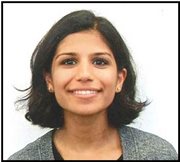Sanjana Dayananda
 Sanjana is a second-year medical student at the University of Pittsburgh School of Medicine. She grew up in Southfield, Michigan, where she began to notice the inequity between suburban and urban residents in Detroit. She took these experiences with her to the University of Pittsburgh and started working with different organizations that addressed social disparities such as the Children’s Institute of Pittsburgh and the Literacy Pittsburgh. After graduating with a degree in English Literature and Neuroscience, Sanjana joined the Coro Fellowship in Public Affairs, a nine-month fellowship in which she worked for the City of Pittsburgh on civic innovation projects and civic engagement platforms. While in medical school, she began to focus more on maternal health disparities and the crisis of maternal mortality here in the U.S. Through the Kean fellowship, Sanjana will continue to explore the issue of maternal morbidity and mortality on a global scale by conducting public health research in the Philippines. Her research aims to assess the barriers to acceptability of soil-treated helminth treatments for pregnant and lactating women in endemic regions, with the added goal of exploring possible mass drug administration interventions for these populations.
Sanjana is a second-year medical student at the University of Pittsburgh School of Medicine. She grew up in Southfield, Michigan, where she began to notice the inequity between suburban and urban residents in Detroit. She took these experiences with her to the University of Pittsburgh and started working with different organizations that addressed social disparities such as the Children’s Institute of Pittsburgh and the Literacy Pittsburgh. After graduating with a degree in English Literature and Neuroscience, Sanjana joined the Coro Fellowship in Public Affairs, a nine-month fellowship in which she worked for the City of Pittsburgh on civic innovation projects and civic engagement platforms. While in medical school, she began to focus more on maternal health disparities and the crisis of maternal mortality here in the U.S. Through the Kean fellowship, Sanjana will continue to explore the issue of maternal morbidity and mortality on a global scale by conducting public health research in the Philippines. Her research aims to assess the barriers to acceptability of soil-treated helminth treatments for pregnant and lactating women in endemic regions, with the added goal of exploring possible mass drug administration interventions for these populations.

Perceptions of Deworming Interventions Among Healthcare workers and Pregnant and Lactating Women in the Philippines
6/03/2019 - 7/29/2019
Philippines
What does the Kean Fellowship mean to you?
The Kean Fellowship has given me the opportunity to delve deeper into global maternal health issues and witness firsthand the effects of mass drug administration and large-scale public health interventions. This qualitative research project will also expand my own knowledge of hypothesis-generating research and how it can be beneficial in understanding global health issues. This fellowship has giving me the means to carry out my own research project, from IRB applications to data analysis, under the supervision of Dr. Vicente Belizario at the University of Philippines - Manila.
What do you anticipate learning?
Through this project, I hope to learn more about qualitative research methods and the impact of hypothesis-generating research on healthcare interventions. Having only conducted quantitative research studies in the past, this will be a new experience for me. I will be working under the guidance of Dr. Judy Chang, a qualitative research expert at the University of Pittsburgh. I also hope to learn about the difficulties of implementing public health interventions. This research project will give me the experience of hearing directly from healthcare workers who treat neglected tropical diseases, understanding how an MDA program is set up within the Philippines healthcare system, and possibly influencing healthcare policies that will improve neglected tropical disease treatment programs in the future. Lastly, I look forward to learning more about Filipino culture, the languages of Tagalog and Bisaya, and the differences in urban and rural communities in the Philippines.
What interests you about tropical medicine and what problems are you interested in solving?
My interest in tropical medicine stems from my interest in global health and health equity. As a medical student and an aspiring healthcare provider, I am committed to addressing health disparities locally in Pittsburgh and globally in developing countries. During my childhood trips home to India, I always noticed the lack of sanitation and the higher rates of illness in rural and urban settings but I did not recognize the systemic public health issues that caused them. Learning about parasitic infections and viruses during medical school shed light on some of these healthcare issues but more than mechanisms of action, I am interested in the sustainable public health solutions and mass drug administration (MDA) programs that can have a large-scale impact in these regions. After conducting and analyzing my research, I hope to bring this knowledge back with me and explore local public health interventions in Pittsburgh, with a particular focus on women’s health and maternal-fetal healthcare. Maternal morbidity and mortality is one of the problems I am most passionate about and most interested in solving, in the U.S. and in developing countries. In the future, I plan to specialize in OB/GYN and continue to address these issues and other public health issues through direct patient care and public health interventions.